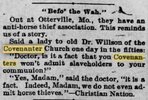Andrew P.C.
Puritan Board Junior
In light of recent events, I thought reflection upon the Reformed Presbytery's continual testimony against slavery would be interesting. These clippings are from a newspaper from 1836. These are in regards to their 1836 Synod meeting.
The Liberator, 24 December 1836
The Liberator, 24 December 1836








